
The Jesus and Mary Chain are a Scottish alternative rock band formed in East Kilbride in 1983. The band revolves around the songwriting partnership of brothers Jim and William Reid, who are the two founders and only consistent members of the band since its formation. They are recognized as key figures in the development of the shoegaze and noise pop subgenres. The band have had twelve top 40 entries and two top 10 hits in the UK Singles Chart in the course of their career.
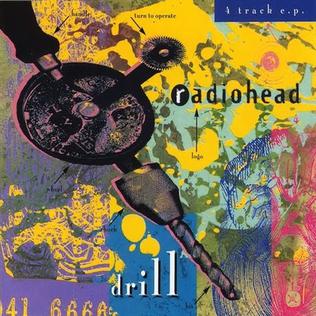
Drill is the debut EP by the English rock band Radiohead, released in May 1992. It was Radiohead's first commercial release, and attracted little attention, reaching 101 on the UK Album Chart. Radiohead rerecorded three Drill songs for their debut album, Pablo Honey (1993).
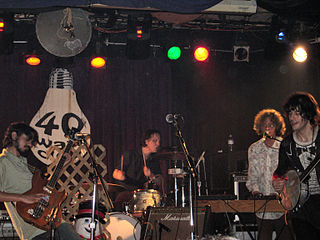
The Olivia Tremor Control were an American psychedelic band from Athens, Georgia that released two studio albums, a bonus disc, a singles collection and a live album between 1996 and 2000. The main members were Will Cullen Hart, Bill Doss, Eric Harris, John Fernandes and Peter Erchick. They combined indie rock and neo-psychedelia, taking influence from psychedelic pop bands of the 1960s, such as the Beach Boys and the Beatles.

Out of Time is the seventh studio album by American alternative rock band R.E.M., released on March 12, 1991, by Warner Bros. Records. With Out of Time, R.E.M.'s status grew from that of a cult band to a massive international act. The record topped the album sales charts in both the United States and the United Kingdom, spending 109 weeks on U.S. album charts, with two separate spells at the top, and spending 183 weeks on the British charts, including one week at the top. The album has sold more than four and a half million copies in the United States and more than 18 million copies worldwide. Out of Time won three Grammy Awards in 1992: one as Best Alternative Music Album, and two for its first single, "Losing My Religion".

Jet Set Radio Future is a 2002 action game developed by Smilebit and published by Sega for the Xbox; it is a sequel to the Dreamcast game Jet Set Radio (2000). As a re-imagining of the original game, it features refined gameplay mechanics, updated graphics, larger open world environments, new characters, an altered plot, a new soundtrack and multiplayer gameplay. The player controls members of the youth street gang, the GGs, that use inline skates to traverse a futuristic Tokyo, spraying graffiti, challenging rival gangs and evading authorities. Jet Set Radio Future uses a cel-shaded style of animation like the original.

Bump of Chicken is a Japanese alternative rock group from Sakura, Chiba. The band members are Motoo Fujiwara, Hiroaki Masukawa (guitar), Yoshifumi Naoi (bass) and Hideo Masu (drums). Since their conception in 1994, they have released 28 singles and 10 albums. They are a popular group in Japan; every release since their third single, "Tentai Kansoku", has charted in the top ten on the Oricon Weekly Charts. Their music has been used in various video games and as theme songs for movies, television shows and anime in Japan.
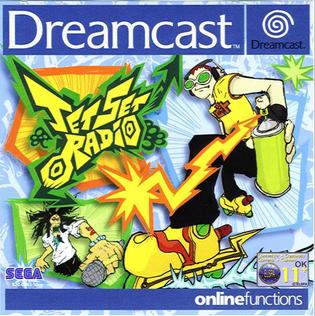
Jet Set Radio is a 2000 action game developed by Smilebit and published by Sega for the Dreamcast. The player controls a member of a youth gang, the GG's, as they use inline skates to traverse Tokyo, spraying graffiti, challenging rival gangs, and evading authorities.

"Come Together" is a song by the British rock band the Beatles, written by John Lennon and credited to Lennon–McCartney. The song is the opening track on the band's 1969 studio album Abbey Road. It was also a double A-side single in the United Kingdom with "Something", reaching No. 4 in the UK charts.
Scapegoat Wax is an American hip hop and breakbeat band from Chico, California that was started by Marty James and Jonny Z.
BS 2000 was an American rock and hip hop group formed by Adam "Ad-Rock" Horovitz and Amery "AWOL" Smith featuring Janay North. Their music features short instrumentals fusing hip-hop and electronic effects. Music on this album was inspired by the French underground band X-Ray Pop.

"Roll Over Beethoven" is a 1956 song written by Chuck Berry, originally released on Chess Records, with "Drifting Heart" as the B-side. The lyrics of the song mention rock and roll and the desire for rhythm and blues to be as respected as classical music. The song has been covered by many other artists, including the Rolling Stones and The Beatles. Rolling Stone magazine ranked it number 97 on its 2004 list of the "500 Greatest Songs of All Time".
Hideki Naganuma is a Japanese composer and DJ who primarily does work for video games. Naganuma is best known for his soundtrack for the game Jet Set Radio and its sequel Jet Set Radio Future.
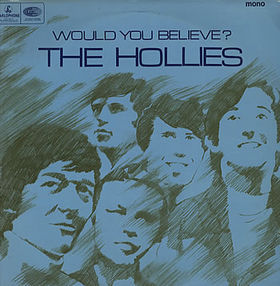
Would You Believe? is the fourth UK album by the Hollies, released in 1966.

Blood is a Japanese band that has been active from 2002 to 2009, returning in 2011. Blood's aim is to create music that expresses the meaning of human emotion that breaks the musical frame. They are closely associated with visual kei, but the band refers to themselves as a "gothic band".
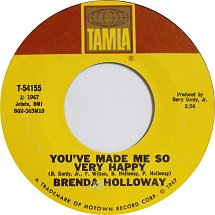
"You've Made Me So Very Happy" is a song written by Brenda Holloway, Patrice Holloway, Frank Wilson and Berry Gordy, and was released first as a single in 1967 by Brenda Holloway on the Tamla label. The song was later a huge hit for jazz-rock band Blood, Sweat & Tears in 1969, and became a Gold record.

R.E.M. was an American alternative rock band formed in Athens, Georgia, in 1980 by drummer Bill Berry, guitarist Peter Buck, bassist Mike Mills, and lead vocalist Michael Stipe, who were students at the University of Georgia. One of the first alternative rock bands, R.E.M. was noted for Buck's ringing, arpeggiated guitar playing, Stipe's distinctive vocal quality, unique stage presence and cryptic lyrics, Mills's melodic bass lines and backing vocals, and Berry's tight, economical drumming. In the early 1990s, other alternative rock acts such as Nirvana, Pixies and Pavement viewed R.E.M. as a pioneer of the genre. After Berry left in 1997, the remaining members continued with mixed critical and commercial success. The band broke up amicably in 2011, having sold more than 90 million albums worldwide and becoming one of the world's best-selling music acts.
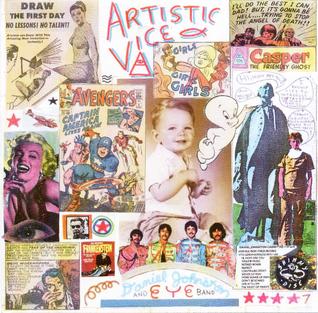
Artistic Vice is the second studio album by singer-songwriter Daniel Johnston, and his twelfth overall, counting his nine widely distributed demo tapes, an earlier aborted attempt at a studio album,, and a collaboration with Jad Fair, It's Spooky. The album is considered more light-hearted than its predecessor, 1990.

Demonic Resurrection is a symphonic death metal band from Mumbai, India, formed in 2000. Its current line-up consists of Sahil "The Demonstealer" Makhija on vocals and rhythm guitar and Virendra "Viru" Kaith on drums. Since its formation, the band has released five studio albums and one EP. The band's fourth album, The Demon King, was released on 13 July 2014 in India, 14 July in Europe and 15 July in the US by Candlelight Records and distributed in India by Universal Music.
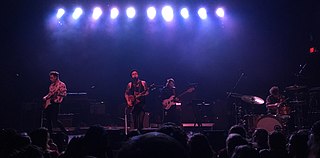
Lovelytheband is an American rock band that formed in 2016 in Los Angeles, California, United States. The band consists of vocalist Mitchy Collins, guitarist Jordan Greenwald, and drummer Sam Price. The band is most known for their single "Broken" which charted on several US Billboard charts.

Dirty Honey is an American rock band from Los Angeles, formed in 2017. It consists of singer Marc LaBelle, guitarist John Notto, bassist Justin Smolian, and drummer Jaydon Bean.
















